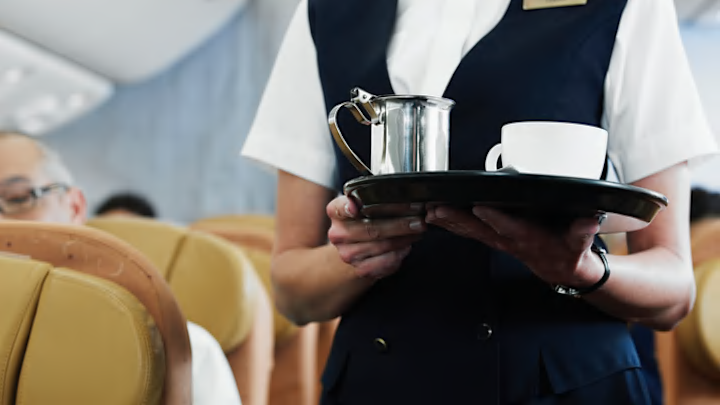As air transport becomes increasingly less glamorous, passengers find themselves grateful for even the smallest in-flight comforts. Beverage service is an amenity that fliers can still depend on, and the arrival of the drinks cart signals the opportunity to enjoy a cold soda or a cup of tomato juice. Caffeine lovers, however, often get their hopes up for a fresh, strong sip of coffee, and are often disappointed by a mediocre brew. It’s not a mass hallucination; in-flight coffee really is underwhelming. The Kitchn investigated and found out why.
The usual culprit in a case of not-so-great coffee is the beans: low-quality beans naturally lead to a low-quality beverage. While airlines might conceivably want to cut costs by stocking up on the cheap stuff, coffee culture is such a force now that most flight providers wouldn’t dare. In fact, certain airlines proudly advertise the quality of their coffee sources. The beans aren’t to blame.
Once the coffee beans have been ruled out, the next most obvious ingredient that could be at fault is the water—the very same water that, according to a 2012 EPA report, tested positive for coliform bacteria in 12 percent of samples from commercial airline water supplies. While coliform bacteria is not in itself harmful, its presence is a sign of less than optimal water quality, and that might be one reason to eschew in-flight coffee altogether—but it’s not the cause of the beverage’s blandness.
Other factors are at play: humidity, noise, altitude, and air pressure. Just as a dry airplane cabin can cause food to taste off, it can do the same to coffee, which falls victim to the same desensitization of a passenger’s taste buds to sweetness and saltiness, and to the the failure of about a third of them entirely. Odor receptors don’t function as well in flight either, and a normally aromatic coffee smells—and tastes—not much better than hot brown water. Even the noise of the engines dampens passengers’ enjoyment of their coffee break, because the 85-decibel drone interrupts the brain’s ability to identity and taste flavor compounds.
All of this spells bad news for caffeine fiends—as long as it’s over 10,000 feet in the air, that cup of coffee is going to taste pretty blah. As far as alternatives go, wine is no better (perhaps even worse). Delta Airlines sommelier Andrea Robinson told The New York Times, “subtlety is not well served at altitude.” However, there may be hope yet for an in-flight treat. Marion Nestle, emerita professor of nutrition and food studies at New York University, told The Times ice cream should still taste fine, no matter how far off the ground you get.
Discover More Answers to Big Questions:
A version of this story was published in 2015; it has been updated for 2025.
